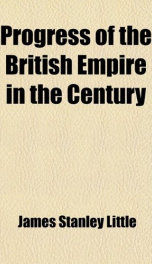progress of the british empire in the century

Purchase of this book includes free trial access to www.million-books.com where you can read more than a million books for free. This is an OCR edition with typos. Excerpt from book: it was not so qualified or understood by these speakers. As we have seen, neither the union of Canada in 1867, nor the attempted union of South Africa in 1873 can be taken, save so far as Lord Carnarvon is concerned, to represent an endorsement of the creed that the Empire must remain one and indivisible in fact, and the fact is unpleasantly obvious, that the majority of these supporters of intercolonial federation regarded that policy as a means to the end most earnestly desiredthe disintegration of the Empire. We all know that the Imperial Federation League failed to accomplish the actual purpose to which it owed its existence, which was " to secure by federation the permanent unity of the Empire." But its dissolution was due to the conviction of a majority of its members that it had succeeded in the main purpose of its existence, in that it had made the cause it bore on its banner the cause of nearly every responsible thinker in England. It had done more. It was the means of compelling almost every statesman and politician of importance, to declare openly and solemnly his assent to the principle involved. That being so, and action being the prerogative of the men who sit in the seats of the mighty, nothing remained to be done, save to wait for the arrival of that psychological moment when academic truths should be interpreted into vital facts. Since the League has been instrumental in getting the subject discussed from every point of view, andit neither aspired nor presumed to formulate a definite scheme of federal union, but trusted rather to the gradual movement toward that end resulting from the steady growth of natural forces, it must be allowed that it had done its work. Its occupation was gone, and its continued existence might have led to mischievous results, since s...
Info about the book
Author:
Series:
Unknown
ISBN:
0521529743
Rating:
4.5/5 (5)Your rating:
0/5
Languge:
English
Users who have this book
Users who want this book
What readers are saying
What do you think? Write your own comment on this book!
write a commentif you like progress of the british empire in the century try:
Other books by this author
Do you want to exchange books? It’s EASY!
Get registered and find other users who want to give their favourite books to good hands!


